 Petzlover
Petzlover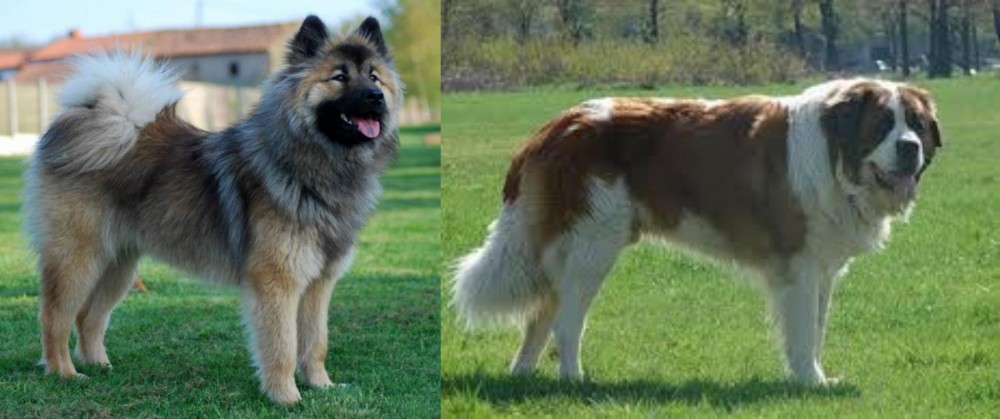 Eurasier is originated from Germany but Moscow Watchdog is originated from Russia. Eurasier may grow 9 cm / 3 inches shorter than Moscow Watchdog. Eurasier may weigh 36 kg / 79 pounds lesser than Moscow Watchdog. Eurasier may live 3 years more than Moscow Watchdog. Both Eurasier and Moscow Watchdog has almost same litter size. Both Eurasier and Moscow Watchdog requires Moderate Maintenance.
Eurasier is originated from Germany but Moscow Watchdog is originated from Russia. Eurasier may grow 9 cm / 3 inches shorter than Moscow Watchdog. Eurasier may weigh 36 kg / 79 pounds lesser than Moscow Watchdog. Eurasier may live 3 years more than Moscow Watchdog. Both Eurasier and Moscow Watchdog has almost same litter size. Both Eurasier and Moscow Watchdog requires Moderate Maintenance.
 The Eurasier is a dog which hails from Germany and is a cross between the Wolf Spitz, the Chow Chow and the Samoyed.
The Eurasier is a dog which hails from Germany and is a cross between the Wolf Spitz, the Chow Chow and the Samoyed.
The puppies of the dog could reproduce themselves, so that a new breed was recognized by the German Kennel Club as well as the Federation Cynologique Internationale.
It is believed that the name was chosen as a referral to the dog’s European and Asian background. Today the Eurasier is found in most European Union countries as well as in Canada and the United States, but still the breed’s population is low, with efforts in place to raise its numbers.
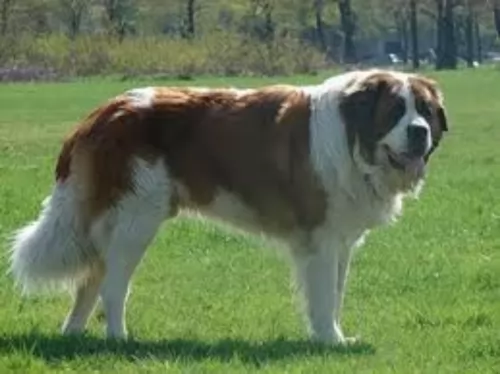 The Moscow Watchdog is a cross between the Caucasian Oytcharka, the St. Bernard and other Russian hound dogs. This large breed dog was developed in the Soviet Union for the purpose of being guard dogs. It had the awareness and assertiveness of the Oytcharka and the size, intelligence and attractiveness of the St. Bernard. The breed is common in Russia today but hardly seen anywhere else even though they were exported to the United States and Europe. The breed had the first U.S. born litter in 2015 and it is not AKC recognized.
The Moscow Watchdog is a cross between the Caucasian Oytcharka, the St. Bernard and other Russian hound dogs. This large breed dog was developed in the Soviet Union for the purpose of being guard dogs. It had the awareness and assertiveness of the Oytcharka and the size, intelligence and attractiveness of the St. Bernard. The breed is common in Russia today but hardly seen anywhere else even though they were exported to the United States and Europe. The breed had the first U.S. born litter in 2015 and it is not AKC recognized.
Following the second world war crime was on the rise in the Soviet Union and a new breed of dog was needed to counter this trend. The dog had to be adaptable to very cold temperatures, snowy weather and have a guard dog personality and ability. The breed was called on to guard such locations as railroads, government offices, warehouses, infrastructure and labor camps.
The project to develop this breed was led by General Medvedev beginning in 1946 at the Central School of Military Kynology – which was a department of the Soviet Ministry of Defense. It took many years to develop the Moscow Watchdog which then became a very successful breed.
It took until 1985 for the breed to be “officially” recognized in the Soviet Union and until 1992 to be recognized by the Federation of Dog Breeders in Russia and until 1997 for the standard to be approved by the Russian Kennel Club. They are still working with the FCI to gain international recognition for the breed. At the moment they are considered a part of the Molosser group and shown in the “Special Show” in Russia.
Committed breeders brought the Moscow Watchdog to Hungary in 1986 in order to make the breed more popular. In addition to this there were many breeders from previous Soviet States that wanted to preserve the breed as well. There were about 500 Moscow Watchdogs in Hungary around then. Currently there are about 27 Moscow Watchdogs in the United States. The breed is known to be a gentle giant and very much a family dog these days.
 The Eurasier is a medium-sized dog, standing at roughly 48cm to 60cm in height and weighing 18kg to 32kg. He has a medium to long length coat in a range of different colors – fawn, black and tan as well as a mix of colors such as silver and black.
The Eurasier is a medium-sized dog, standing at roughly 48cm to 60cm in height and weighing 18kg to 32kg. He has a medium to long length coat in a range of different colors – fawn, black and tan as well as a mix of colors such as silver and black.
He has medium-sized, erect ears and the tail is always held over the back. The nose is black and the eyes are also medium in size and dark and should never be obscured by the dog’s hair.
Confident while being reserved around strangers, the calm Eurasier isn’t an aggressive dog.Bred as a companion animal, he is tolerant of other pets in the house as well as with children, and having him socialized and trained will ensure that he is obedient, relaxed and amicable. He is an intelligent dog and responds well to training.
He loves to be with his human family and will adapt happily to city- or country life. He doesn’t have high activity levels so daily walks and ball games will be sufficient for him.
He isn’t the kind of dog that you can keep in your backyard as a watchdog and then just neglect him. He’ll become bored and destructive through no fault of his own.
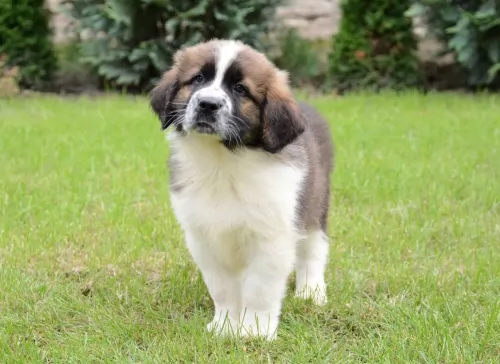 The Moscow Watchdog is related to the mountain dogs and is a very large breed. They are sturdy, muscular and powerful. They have big heads and a thick double coat that sheds profusely four times a year. They have a long tail, an arched chest and an air of confidence.
The Moscow Watchdog is related to the mountain dogs and is a very large breed. They are sturdy, muscular and powerful. They have big heads and a thick double coat that sheds profusely four times a year. They have a long tail, an arched chest and an air of confidence.
He is in the Mastiff family and is smart and trainable. He is not clumsy but has big bones. He is surprisingly agile and active for a dog his size. Unlike the St. Bernard he is not a couch potato. He is also differentiated from the St. Bernard because he does not drool.
These dogs are large but they’ve got a gentle temperament and are good with kids, being playful and energetic with them.
Even though he is a docile dog, you want him trained and socialized, and then he gets along well with other pets too. His sheer size makes it that it is best to supervise him when he’s around small children. He is also a protective dog breed, willing to bond closely to, and protect his human family.
 You can just see on the face of the Eurasier that he is a loving, gentle dog who wants to be part of a loving human family.
You can just see on the face of the Eurasier that he is a loving, gentle dog who wants to be part of a loving human family.
As a companion dog he makes a splendidly devoted and loyal pet, wanting to be involved in everything his human ‘pack members’ are doing. He is healthy, intelligent, playful and loving and when you invest in such a pet, you’re investing in a close, loving relationship for many years.
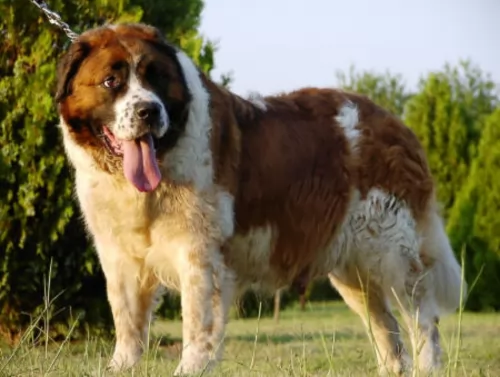 This is a large dog who likes to be involved and busy, even though he is so big. He isn’t suited to city life and being confined to a tiny garden as he needs space.
This is a large dog who likes to be involved and busy, even though he is so big. He isn’t suited to city life and being confined to a tiny garden as he needs space.
They’re independent dogs too and you can leave them alone during the day. He is social, so while you can leave them during the day while you’re at work, he’ll want your attention when you get back. They're such loving, loyal family pets that you owe it to him to make this gentle giant of a dog as happy as can be.
 To a large extent, we have the health of our pets in our hands. The way we treat them – the food we give, the activities he takes part in, his sleeping facilities and the attention we give him all contribute to whether he will be healthy or not.
To a large extent, we have the health of our pets in our hands. The way we treat them – the food we give, the activities he takes part in, his sleeping facilities and the attention we give him all contribute to whether he will be healthy or not.
Nonetheless there are dogs who enjoy the best life and yet they still get sick. The Eurasier is a healthy dog breed who can push 12, 13 or 14 years, but still there are some common dog diseases to look out for.
Problems which are of concern are hip- and elbow dysplasia and patellar Luxation. Patellar luxation is when the dog's kneecap becomes dislocated and you see your pet holding up his hind leg for a while. These dislocated kneecaps are quite common in dogs and can lead to arthritis and even lameness.
Your vet can diagnose this problem through different means to help your pet.
 Moscow Watchdog is looked upon as a fairly healthy dog breed but there are some risks such as hip dysplasia as well as some other large breed problems.
Moscow Watchdog is looked upon as a fairly healthy dog breed but there are some risks such as hip dysplasia as well as some other large breed problems.
With big dogs like this, hip dysplasia is a threat. Its an hereditary condition where the parent dogs pass down the problematic genes. Hip dysplasia results in inflammation and pain for your pet, and where once he loved to play, he is reluctant to and battles to get up after lying down.
 The Eurasier, just like any other dog, requires high quality food. Luckily, as far as convenience goes, there are some excellent commercially manufactured foods, but you still need to check out the ingredients on the packaging as you want to avoid some of the dog foods high in chemicals and fillers.
The Eurasier, just like any other dog, requires high quality food. Luckily, as far as convenience goes, there are some excellent commercially manufactured foods, but you still need to check out the ingredients on the packaging as you want to avoid some of the dog foods high in chemicals and fillers.
The best pet foods are the ones that are high in protein, and meat sources such as chicken, beef or salmon for instance should show up among the top 5 ingredients.
Your Eurasier won’t want to eat kibble every day of his life so add in your own homemade cooked brown rice, vegetables and chicken from time to time. Also, every now and again, it will be of tremendous value to your pet’s immune system to include some raw meat.
Brush your Eurasier twice a week to keep his coat shiny and healthy. Grooming your pet has a number of benefits apart from making him look good. It infuses him with a healthy glow – he literally glows with a sense of wellbeing and confidence because you care for him.
The benefits of brushing your pet include better blood circulation and a shinier, healthier coat. Also check your dog’s nails, check his ears inside and out and make sure to attend to his teeth 2 or 3x a week. There are special toothbrush and toothpaste designed specifically for dogs.
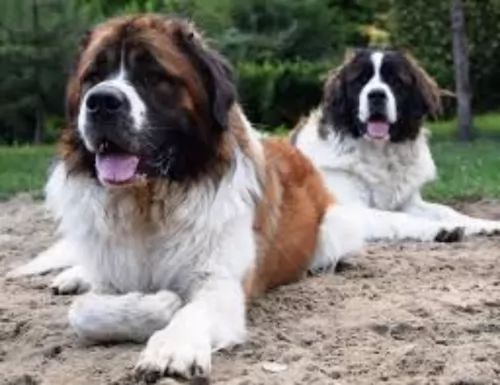 The Moscow Watchdog is a giant sized dog and will require a lot of regular exercise, and apart from a fairly brisk daily walk, will also need games and a run in the park.
The Moscow Watchdog is a giant sized dog and will require a lot of regular exercise, and apart from a fairly brisk daily walk, will also need games and a run in the park.
As a large dog requiring a regular dose of physical exercise as well as mental stimulation, he is better suited to life in the country or at least where there is a large garden.
The Moscow Watchdog has a medium length coat, and as a moderate shedder, you will need to simply brush his coat twice a week to remove loose hair. There is no professional grooming required for these dogs.
Homemade food is always a treat for a dog, but if you’re feeding your Moscow Watchdog commercially manufactured food because of the sheer convenience it provides, make sure the packaging says 'large- or giant dog breed' food. This way you know your pet is getting the right amount of minerals and vitamins for his size.
Always buy the best quality food to avoid giving your pet an overdose of colorants and preservatives. Try and give your pet some home-made food such as boiled chicken, some brown rice or pasta and some cooked vegetables such as sweet potatoes, carrots and spinach. These can be added to his kibble every now and again.
A simple diet like this agrees with your pet and he will be healthy and happy with his lot.